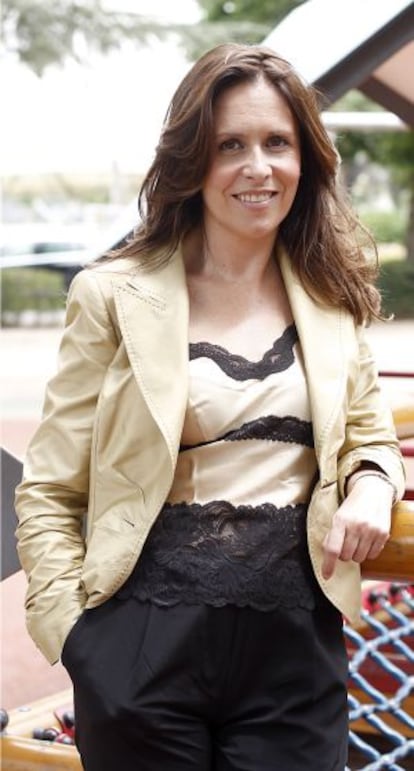"We need a change to integrate Spain's disabled 10 percent"
Carina Escobar of the ONCE Foundation on employment and the disabled

She has had to overcome (and still does) so many difficulties in life that her enthusiasm is positively infectious. At 42, Carina Escobar is head of marketing and human resources at ONCE Foundation, which provides training and employment for people with disabilities.
?Escobar uses the terms dream, challenge, hope and emotions over and over again. When she was 12 she was diagnosed with ulcerative colitis, which derived into a spondylitis that made 70 percent of her body stiff ("it's like having a stiff neck all over," she says). But this vigorous woman from the Canary Islands decided long ago that she did not want to be a sickly, overprotected child. So she got a university degree in Tenerife and later obtained a master's in economic and financial business administration in Madrid. "My family's main goal was simply to get me to survive," she recalls. But in between hospital stays, Carina dreamed of studying. "My challenge included reaching an emotional balance that would let me be generous with my family and my friends, so as to give them back everything that they had given me."
It was back in Tenerife that she learned how to enjoy the moment. "Even though everyone told me to take care of myself and go home, I went out every night."
One of her greatest discoveries was going to work for ONCE Foundation, a business group that runs hotels, laundromats, security companies and media outlets. "Disabilities are obviously not a problem around here. So I went from a very protective environment to a search for independence."
Escobar defines herself as very pragmatic and adaptable due to circumstances, and during lunch she stressed her need to follow a strict diet, which on this particular day consisted of codfish, a sherbet and some herbal tea. In the opinion of this woman with an "invisible disability," legislation favoring disabled people has made progress in recent decades and there are increasingly fewer barriers, either physical or metaphorical.
"But society in general and companies in particular need a greater change in mentality to integrate that 10 percent of the Spanish population which is disabled," she says. "I always ask companies not to take disabilities into account when they are selecting personnel, but rather the skills needed for a particular position. Among these is motivation, of course. I always say that within companies we are guilty of giving out lots of numbers but few emotions."
And this, from someone who heads a department of 9,000 people in a business group that continues to post profits and create jobs in the middle of this terrible crisis. Carina Escobar hopes that one day, disabled people's associations will appear in the business pages rather than in the soft news section. "We have turned necessity into a virtue because adapting new technologies to disabled users has forced us to innovate, which to me seems like the best verb to overcome the crisis."
Tu suscripci¨®n se est¨¢ usando en otro dispositivo
?Quieres a?adir otro usuario a tu suscripci¨®n?
Si contin¨²as leyendo en este dispositivo, no se podr¨¢ leer en el otro.
FlechaTu suscripci¨®n se est¨¢ usando en otro dispositivo y solo puedes acceder a EL PA?S desde un dispositivo a la vez.
Si quieres compartir tu cuenta, cambia tu suscripci¨®n a la modalidad Premium, as¨ª podr¨¢s a?adir otro usuario. Cada uno acceder¨¢ con su propia cuenta de email, lo que os permitir¨¢ personalizar vuestra experiencia en EL PA?S.
?Tienes una suscripci¨®n de empresa? Accede aqu¨ª para contratar m¨¢s cuentas.
En el caso de no saber qui¨¦n est¨¢ usando tu cuenta, te recomendamos cambiar tu contrase?a aqu¨ª.
Si decides continuar compartiendo tu cuenta, este mensaje se mostrar¨¢ en tu dispositivo y en el de la otra persona que est¨¢ usando tu cuenta de forma indefinida, afectando a tu experiencia de lectura. Puedes consultar aqu¨ª los t¨¦rminos y condiciones de la suscripci¨®n digital.









































